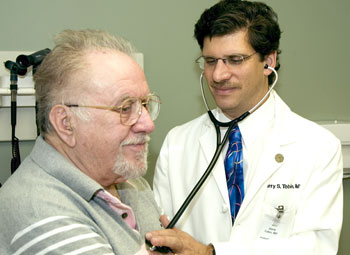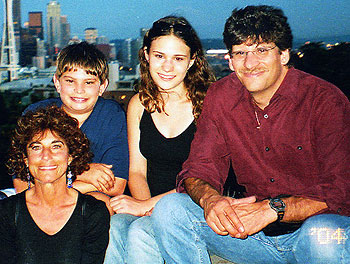A new suite of offices, education rooms and exam rooms has opened on the 13th floor of the Center for Advanced Medicine. These constitute the Washington University Diabetes Center at Barnes-Jewish Hospital, a response to the growing epidemic of diabetes, both in the St. Louis region and around the United States.
“The center was built with the idea that it would be a resource for the community, and the information and educational programs we put together would be shared across the community with other physicians,” says Garry S. Tobin, M.D., associate professor of medicine and director of the center.

“If we develop a new way of educating larger groups of patients, then other providers and organizations will be able to benefit. It’s all about improving care for patients and improving health for our community.”
Since 1990, Tobin has been working with diabetic patients, often trying to convince them to manage their condition more carefully. After 15 years as an endocrinologist at the Grant Medical Clinic in the Central West End, he joined the full-time faculty in 2005 to assist in the creation, design and direction of the Diabetes Center. He says his role through the years has been to guide patients from where they are to where they need to be.
“Diabetes is a disease the patient has to manage on a day-to-day basis,” he says. “I can’t manage their disease but must empower them with the tools to manage their diabetes. Success or failure is measured according to how well a patient prevents or delays complications.”
Tobin says his role is to adjust medications and make sure patients are educated about the dangers of diabetes and how best to control their blood sugar levels so that they can better manage their disease, always keeping an eye on the long term.
“I basically tell patients that controlling their diabetes is like an investment,” he explains. “It’s an investment they make now that pays dividends 10 years later. Controlling blood glucose will clearly be worth it when they develop fewer complications 5 to 10 years down the road.”
A change in career path
Tobin didn’t start out to be a diabetes doctor. Most of his extended family was in the grocery business. Tobin’s father, Bernard, worked in insurance and later as an investment broker. His mother, Cecile, was personnel director at Tipton Electric and later at First Financial Planners. Tobin, a native St. Louisan (Parkway Central High School, Class of 1977) started his college career as a chemical engineering major at the University of Missouri-Rolla.
Although he always had an interest in biological sciences, Tobin was planning to be an engineer until he spent a summer at the School of Medicine in the lab of the late Louis Avioli, M.D. Avioli was a world-renowned expert on osteoporosis, and Tobin studied cellular mitochondria and their effect on vitamin D metabolism. He found himself in awe of the sometimes-gruff division chief.
“Dr. Avioli had a brilliant mind, and he had the personality to lead a division,” Tobin says. “He had a bit of bluster about him, but his bark was worse than his bite. I kind of wished I had his moxie.”

That summer undergraduate experience changed Tobin’s career path. He applied for admission to the School of Medicine, and he’s been associated with Washington University and Barnes-Jewish Hospital ever since. He completed his medical degree in 1985, finished a residency in internal medicine in 1988 and a fellowship in endocrinology and metabolism in 1990, the same year he went into private practice and joined the University’s voluntary clinical faculty.
Tobin had been planning a career in research, but as he puts it, “Life happens.” He got married during his residency, started a family and decided to work in the clinic almost exclusively. But he spent those years thinking about how diabetes care is delivered and working to find better ways to do it. Last year when he was offered the opportunity to come back to WUSTL full time and create a new Diabetes Center, he jumped at the chance.
“It was a great opportunity,” he says. “They wanted me to both design and create something that hadn’t existed at the University, something that would challenge me from an academic, research and intellectual standpoint. I chose to accept that challenge. At times I think I need my head examined, but overall, I think it was the right decision for me.”
Tobin certainly is the right man for the job, according to Clay F. Semenkovich, M.D., professor of medicine and of cell biology and physiology and chief of the Division of Endocrinology, Metabolism and Lipid Research.
“I first met Garry over 20 years ago when he was a house officer and I was a chief resident,” he says. “Garry is both compassionate and passionate — compassionate with his patients and passionate about knowing everything about diabetes. He is the kind of person you would want to have as your own physician, and Washington University was fortunate to attract him to direct the new Diabetes Center.”
Finding time for exercise
Changing jobs and launching a major new project can eat up a lot of time, but Tobin still finds time for exercise — something he is continually urging his patients to do. On a typical day, he’s out of bed by 4:30 a.m. and on his bicycle, riding in the dark from his home in Olivette to his office in the Center for Advanced Medicine. By 5:20 a.m. when he gets to work, he’s already got significant exercise under his belt, and that helps keep fat from gathering in the same region. It also helps him later in the day when counseling a patient with diabetes.
|
Garry S. Tobin Born: Aug. 28, 1959, St. Louis, Mo. Education: Bachelor of science, summa cum laude, 1981, University of Missouri-Rolla; M.D. 1985, Washington University School of Medicine University position: associate professor of medicine, Division of Endocrinology, Metabolism and Lipid Research Director: Washington University Diabetes Center at Barnes-Jewish Hospital Family: Wife Lynn. Stepdaughter Ali Kalina (32) is a graduate of the Barnes College of Nursing and married to former Barnes-Jewish emergency department physician Jeffrey Kalina, and they have a 4-year old daughter, Taylor. Stepdaughter Emily Sanders (25) is an actress living in Las Vegas. Daughter Ariana Tobin (17) is a senior at Ladue High School who has applied to WUSTL. Son Joshua Tobin (14) is a freshman at Ladue High School. |
“I’ll usually say something about how I’m not sure I know anybody else who’s any busier than I am, so if I can find time to incorporate exercise, maybe that person can, too,” he says. “I know by riding to work, I’m taking care of myself and setting an example for others, but that’s not why I do it. I do it for transportation.”
He usually parks the bike at home around 7 p.m., in time for another important activity, dinner with the family. He has two grown stepdaughters, but Tobin and his wife, Lynn, still have a 17-year-old daughter and a 14-year-old son at home.
“Sitting down at the dinner table and talking about life is probably the most stimulating time we share,” he says. “My kids have pretty vociferous opinions. Not always mine, but it’s always fun.”
On weekends, he skates. Tobin gets together with a group that either speed skates on ice, or roller blades 15 to 20 miles on bike paths or other trails. He’s a member of the Metro Speedskating Club. Over the years, numerous club members have become U.S. Olympic ice speedskaters, but Tobin doesn’t compete.
“He may not officially compete, but ‘Speedy Garry’ is pretty competitive,” says Robert Samuels, a skating buddy who also happens to be one of Tobin’s patients. “When he first started, he couldn’t even stand up on the ice, but over the years he’s gotten much better. Now he’s fast, he’s strong, and he’s a pretty good doctor, too.”
Occasionally, Tobin slows down. He has a pottery wheel at home, and he hopes to put a studio in his house someday. Right now, however, there’s not much spare time for throwing pots and driving to the kiln at Craft Alliance to fire them.
“I’m not doing as much of that as I used to, but I like doing things with my hands, and I find making pottery very rewarding,” he says. “It’s a time issue more than anything. Most of my days are pretty full.”